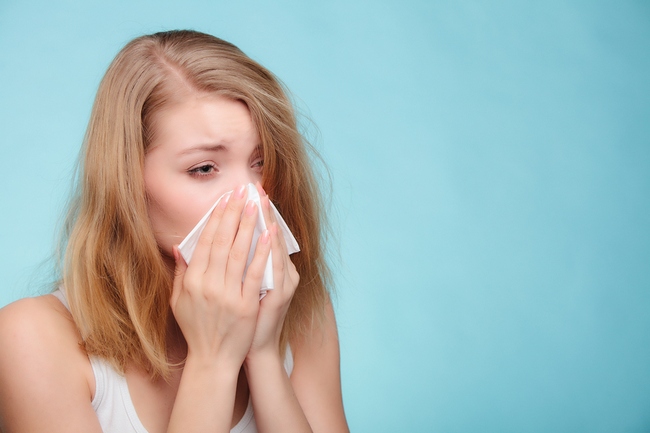- Make It Yourself Lavender Heart-Shaped Bath Bombs!
- 20 Things You Never Knew About “Down There”
- 12 Best Foods For Those Suffering From Arthritis Pain
- 12 Personal Hygiene Mistakes Almost Everyone Makes (Mom Never Told You About #4!)
- 15 Medicinal Plants And Herbs From The Cherokee People
- 12 Mind-Blowing Benefits Of Drinking Coconut Water During Pregnancy
- 12 Outstanding Winter Foods That Won’t Fatten You Up Like A Christmas Turkey
Got Allergies? Avoid these 7 Mistakes
We all know someone who has seasonal allergies. With more than 50 million people plagued by hay fever, there are a whole lot of people looking for a little relief when the pollen hits the fan.
However, while trying to relieve their irritated sinuses and itchy eyes, many allergy sufferers make the same mistakes every year, which only makes their problems worse.
Read on about the top 7mistakes many people with allergies make year after year and see if you can help relieve that runny nose and endless sneezing by avoiding these pitfalls.

Photo credit: bigstock
1. Waiting too long to take medication
If you think you are going to tuff it out this allergy season, well, let’s be frank, you are only fooling yourself. You know that after just about a week, more or less, you are going to be looking for that Benadryl box. You are much better off treating allergies right at the beginning of the season. In fact, many doctors will advise you to take your medication about a week before the season typically starts, or at the very first sign of allergy symptoms. This can help reduce the severity of your symptoms and you might end up using less medication overall.
SEE ALSO: Top 5 Signs You Might Have a Food Allergy or Sensitivity
2. The overuse of nasal sprays
Although nasal sprays are a great way to relieve your symptoms quickly, most people use them way too often. Overuse can actually irritate your sinuses even more, including the lining of your nose. This will cause your nose to become severely congested because the lining will swell. Of course most people’s answer to this is to spray even more and…well; you can see where this is going. Limit your spray days to five days in a row, and then take a 5 day break.
3. Spending way too much on over the counter relief
When you can’t stop sneezing and those watery, itchy eyes start driving you crazy, most people will head to their local drugstore and start buying a variety of products, anything that they think will give them some relief; nasal sprays, eye drops, antihistamines, you name it. Although this is the typical approach, it’s not necessarily the smartest, nor the most cost effective way to handle the situation. Seeing an allergist who can pinpoint whatever it is that causing your particular allergy can bring you great relief. An allergist will create a plan of action for you to follow that will work wonders for your exact allergy.
4. Opening the windows
If you didn’t know this already, the wind is not your friend if you suffer from allergies. Even though it might be tempting to let in the fresh, cool air, this is generally a big mistake for those with allergies because with the wind comes the pollen. Keep windows closed and run the air conditioner. Keep your car air conditioner on recirculate.
YOU MIGHT BE INTERESTED IN: 7 All Natural Allergy Remedies that Work
5. Neglecting your eyes
Most people think that pollen enters through the nose but actually a great deal of it enters through your eyes. Protecting your eyes by using sunglasses and wide brimmed hats will help block out a lot of the pollen from your nose and eyes. Use special rinses for your eyes to wash away pollen and then antihistamine drops to relieve those itchy, red eyes.
6. Not doing more to keep pollen away
Pollen can attach itself to almost anything, shoes, clothes, hair, and pets, which then introduces these allergens inside your home or office. Keep your pet clean and brushed, and remember to keep your hair clean as well. Try taking a shower in the evenings to avoid the pollen making a home on your pillow. This way, you don’t have to sleep in a pollen cloud all night long. For many, saline nasal sprays work wonders. Think of them as a shower for inside your nose that will gently wash away pollen from the inside. It’s also a good idea, during allergy season, to use a clothes dryer and not hang laundry outside.
7. Eating foods that aggravate allergies
For some people with allergies, when they eat certain fresh vegetables, fruits, or nuts, they may find that they get an itchy mouth, throat, and swollen lips. This is called oral allergy syndrome. This is a cross-reaction that occurs because the same proteins that are in pollen are also present in related foods. Your immune system recognizes those similar proteins and has a similar allergic reaction to it. For example, some people who are allergic to birch pollen will find that they have an oral allergic reaction to carrots, peaches, almonds, or apples. You can either avoid the offending food until after the allergy season has passed, or you can try a canned or frozen version of the same food. You can also try peeling and cooking those foods. This will destroy the protein and allow your body to accept these foods without giving you that itchy mouth.
Sources:





























